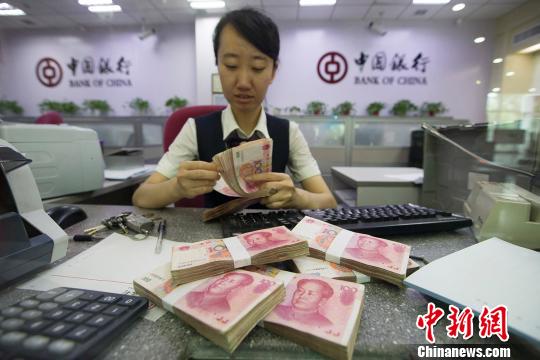China forex reserves rise for 6th month as economy improves
China's foreign exchange reserves rose for a sixth consecutive month in July as pressure from capital outflows eased and the value of the U.S. dollar weakened, data from the central bank showed Monday.
|
Bank employee counts 100 RMB notes at a Bank of China branch in Taiyuan, capital of Shanxi Province. [Photo/Chinanews.com] |
Forex reserves reached 3.081 trillion U.S. dollars by the end of July, increasing 23.93 billion U.S. dollars from a month earlier, according to the People's Bank of China.
It is the first time that the reserves expanded for six months in a row since June 2014.
In an online statement, the State Administration of Foreign Exchange (SAFE) attributed the rise to stable cross-border capital flows and the relative appreciation of non-U.S. dollar currencies.
The U.S. dollar declined against most major currencies last month due to political uncertainty in Washington and weak economic data.
The dollar index, which measures the greenback against six major peers, went down 2.89 percent in July, driving up the rise in dollar-denominated reserves.
There had been concerns over capital flowing out of the Chinese market in the second half of 2016, when the economy was facing looming downward pressures and the Chinese yuan was in the middle of a losing streak against the U.S. dollar.
As China's economy stands on a firmer footing and the yuan continues to stabilize, the stockpile has increased steadily from February.
China's economy expanded 6.9 percent for the first half of 2017, with consumption and services, together with new innovation-driven economic sectors, taking up larger roles in the economy that had prompted global institutions such as the IMF to raise GDP forecasts for the country.
With such positive changes continuing to accumulate and China further opening up the financial market, cross-border capital flow will further stabilize, according to SAFE.
"A stronger yuan, resilient growth and buoyant markets all helped keep the brakes on outflows," said Bloomberg chief Asia economist Tom Orlik. adding valuation adjustments were a significant contributor to July's reserves rise.
Looking forward, the beginning of the Federal Reserves's balance sheet unwind is set to add complexity to China's management of the capital account, he said.
China's regulator said last month that the country was seeing its most balanced forex market supply and demand in three years due to improving economies at home and abroad as well as an intensified crackdown on irregularities.
The impact of the U.S. Federal Reserve's interest rate hikes on China's cross-border capital flows had diminished, and the risks of large-scale capital outflows from China would notably ease, according to SAFE spokesperson Wang Chunying.
In response to reports that China is tightening scrutiny on business overseas investment, Wang said the government would continue to support authentic and rational outbound investment but keep a close eye on overseas investment in sectors such as real estate, entertainment and athletic clubs.
China will further improve its management system to facilitate cross-border investment and fund-raising, while guarding against risks, she said.
In recent years, SAFE has meted out punishment in 25 cases of irregularities involving foreign exchange, with fines totalling 33.86 million yuan (US$5 million).
Monday's data showed that the country's gold reserves rose to 75.08 billion dollars by the end of July from 73.59 billion dollars at the end of June.
